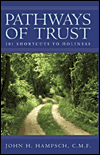 Pathways of Trust is the name of an incredible book but it's also a metaphor for our spiritual journey.
Pathways of Trust is the name of an incredible book but it's also a metaphor for our spiritual journey.As I thought about where I am on my figurative journey, I began to wonder if that's at least one reason why we as Catholics participate in Eucharistic Processions. Recently I've been following Pete Caccavari's awesome blog, The Food Which Endures, entirely devoted to the Holy Eucharist, where he's been discussing post-by-post how he's been led along this Pathway of Trust toward Eucharistic Adoration and Procession.
All of this seems to be exactly what the Holy Father was talking about on World Communications Day, when he spoke on how the internet can promote the search for truth.
Pathways of Trust has taught me more about my spiritual blind spot, failure to trust in the Lord, than I ever knew I didn't know. From the opening page, Pathways awakens in the reader the awareness of the primacy and centrality of trust in relationship with God through simple, everyday examples, quotes, and amusing vignettes.
Pathways has a smaller subtitle: 101 Shortcuts to Holiness. Don't let that put you off. If you're like me, you don't believe in gimmicks or "shortcuts" when it comes to matters of spirituality, 'it is a narrow gate and a hard road that leads to life, and only a few find it.' (Matt 7:14) So please don't think this is one of those books that purports to have all the answers served up on a silver platter. It doesn't. Pathways is simply divided into One Hundred and One chapters with each individual chapter entitled, "SOMETHING and Trust"; they aren't 'shortcuts' so much as convenient topical subdivisions.
I wanted to race through this book at times, but I forced myself to just read one of the chapters each day . . . or sometimes two or three. It begins with, "Holiness and Trust" and then there is a section on, "Belief and Trust" and "Anxiety and Trust", etc. So step-by-step, it teaches you what Trust is and how it pertains to your relationship to yourself, God, and others.
Here are some of my favorite quotes:
'Here is something to really worry about: If you are worried for five minutes, then for those five minutes you are not fully in God's Will.' p. 23
'Self is a kind of disease that we must strive to control throughout our lifetime... Self-discipline has three distinct connotations: the first is the notion of self-punishment... The second connotation sees self-discipline as a corrective process to strengthen and mold the individual to fit into some required social or cultural pattern... The third connotation is the only one that makes self-discipline a virtue: it is a quality by which the individual cultivates certain ethical and moral standards of conduct that he or she is prepared to to adhere to unflinchingly, in all circumstances, regardless of any foreseen or unforeseen painful consequences.' p. 31
'One of God's purposes in increasing our trials is to sensitize us to people we never would have been able to relate to otherwise.' p. 42
'...the sublimated form of faith called trust is neither faith in my faith, nor faith in my prayer, but a trustful faith in a trustworthy and faithful God who will never forsake me.' p. 48
'In relying more on the God of consolations than on the consolations of God, trust seeks the Giver more ardently than it seeks his gifts.' p. 61
Countless Scripture passages litter the pages reminding the reader over and over that God is not only the one true Hope, the source of all Life, Peace, Love and Joy, but we can only trust in Him. And paradoxically, it is only in trusting in Him to provide that initial trust, we can even begin the process. God is faithful.
Most highly recommended! Thanks Wanda for leading me to this wonderful book. And I must also mention that Father John H. Hampsch, C.M.F. has written another book, The Healing Power of the Eucharist, which I'm told is every bit as good as Pathways and hope to read and review here very soon.

Check out my books on Goodreads!

No comments:
Post a Comment